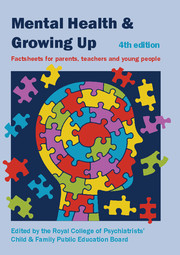Book contents
- Frontmatter
- Contents
- Contributors
- Factsheets for young people
- 1 Bipolar disorder
- 2 Cannabis and mental health
- 3 Cognitive–behavioural therapy (CBT)
- 4 Coping with stress
- 5 Depression
- 6 Drugs and alcohol
- 7 Exercise and mental health
- 8 Mental illness in a parent
- 9 Obsessive–compulsive disorder (OCD)
- 10 Psychosis
- 11 Schizophrenia
- 12 When bad things happen – overcoming adversity and developing resilience
- 13 Worries about weight and eating problems
- 14 Worries and anxieties
- 15 Who's who in child and adolescent mental health services (CAMHS)
- Factsheets for parents, carers and anyone who works with young people
4 - Coping with stress
from Factsheets for young people
Published online by Cambridge University Press: 02 January 2018
- Frontmatter
- Contents
- Contributors
- Factsheets for young people
- 1 Bipolar disorder
- 2 Cannabis and mental health
- 3 Cognitive–behavioural therapy (CBT)
- 4 Coping with stress
- 5 Depression
- 6 Drugs and alcohol
- 7 Exercise and mental health
- 8 Mental illness in a parent
- 9 Obsessive–compulsive disorder (OCD)
- 10 Psychosis
- 11 Schizophrenia
- 12 When bad things happen – overcoming adversity and developing resilience
- 13 Worries about weight and eating problems
- 14 Worries and anxieties
- 15 Who's who in child and adolescent mental health services (CAMHS)
- Factsheets for parents, carers and anyone who works with young people
Summary
What causes stress?
There are many reasons why you might feel stressed, for example:
• schoolwork piling up
• preparing for exams
• being teased or bullied at school
• arguing with parents, brothers or sisters, or friends.
Stress can be even worse if your family is breaking up, someone close to you is ill or dies, or if you are being physically or sexually abused. People vary in the amount that they get stressed by things – you may find that you get very stressed out by exams, but your friends don't seem bothered.
Positive events can also be stressful. For example, starting a new college or going to university. Many people need a little bit of stress to give them the ‘get up and go’ to do things that are important to them.
What are the effects of stress?
Stress can affect different people in different ways. Stress can affect your body and your feelings. Some of the effects are listed below.
Effects of stress on your body:
• feeling tired
• having difficulty sleeping
• going off your food
• stomach aches
• headaches
• aches and pains in your neck and shoulders.
Effects of stress on your feelings:
• feeling sad
• being irritable, losing your temper easily
• finding it hard to keep your mind on schoolwork.
How do I cope with stress?
There are several things that you can do to help yourself cope.
• Don't suffer in silence! Feeling alone makes stress harder to deal with.
• Talking to somebody you trust can really help you to deal with stress and to work out how to tackle the problems that are causing it.
• Make a list of all the things in your life that are making you feel stressed – write them down on a piece of paper. Then take each one in turn and list all the things you could do to tackle it. This can help you sort things out in your head. Problems look easier to deal with one at a time than in a big jumble in your head.
- Type
- Chapter
- Information
- Mental Health and Growing UpFactsheets for Parents, Teachers and Young People, pp. 10 - 12Publisher: Royal College of PsychiatristsPrint publication year: 2013



